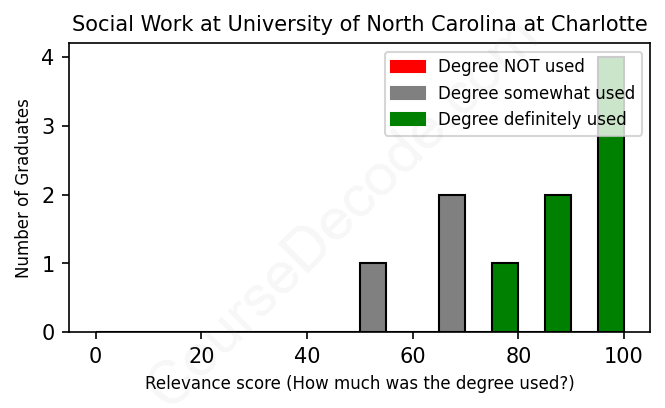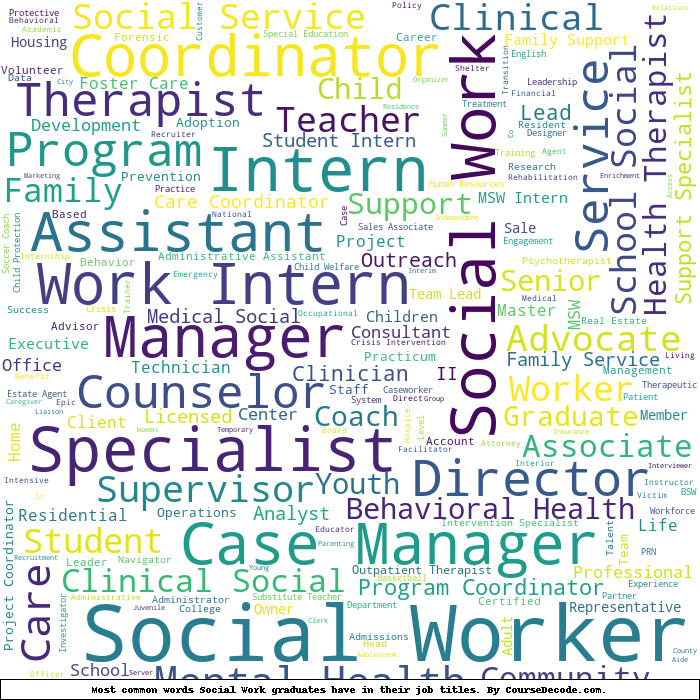
First, some facts. Of the Social Work graduates from University of North Carolina at Charlotte we've analyzed , here's how many have used (or NOT used) their degree in their career:

These are estimates based on AI analysis of 10 LinkedIn profiles (see below).
The verdict? Significantly above average. Overall, with an average relevance score of 83%, Social Work graduates from University of North Carolina at Charlotte have a much higher likelihood (+16%) of finding work in this field compared to the average graduate across all fields:
And for comparison, here's the chart for all profiles we've looked at across all degrees.
Also, after graduating, 40% of these graduates have pursued further education other than another Bachelor's degree (such as a Masters degree or other), compared to the average across all profiles of 35%. This suggests you may need more than just a Bachelors degree to be competitive as a Social Work graduate.
See the details:
|
Relevance score: 85% We think this person has gone into a career highly relevant to their degree. We think this person has gone into a career highly relevant to their degree.
DEGREE INFOGraduated in 2013 from University of North Carolina at Charlotte with a Bachelor of Social Work in Social Work. No other secondary education since. JOB HISTORY SINCE GRADUATIONWeekend Night Manager Catherine's House Mar 2013 - Jun 2014 Financial Assistance Interviewer  AmeriCorps Sep 2013 - Aug 2014 Family Services Recruitment Coordinator  Habitat for Humanity Charlotte Aug 2014 - Jul 2016 Youth Development Promoter  Peace Corps Aug 2016 - Oct 2018 Temporary Administrative Assistant  EPIC LABOR SERVICES INC Nov 2018 - Apr 2019 Social Worker  New Hanover County Aug 2019 - Feb 2022 Community Development Specialist  City of Wilmington, NC May 2022 - Oct 2022 Community Development Analyst-Compliance  City of Wilmington, NC Oct 2022 - Present ABOUTEmpathetic and highly organized human services professional withproven experience coordinating programs and services for individualsand families in community and government organizations. My ability to adapt to new situations and passion for learning about and empowering others is what motivates me to serve my community. |
The top 10 most common jobs done by the graduates we've analyzed (ranked most common to least) are:
Based on the LinkedIn profiles of graduates from the University of North Carolina at Charlotte with a degree in Social Work, it seems like many of them end up in roles that are pretty relevant to what they studied. A lot of recent grads have taken positions like Counseling Interns, Social Workers, and Behavioral Therapists, which directly apply the skills and knowledge they learned in their program. These roles involve working with individuals, families, or communities to provide support, counseling, and resource navigation, which are essential components of social work practice.
However, not all jobs align directly with social work. Some people have taken on administrative or managerial roles, like Administrative Assistant or Operations Manager, where the link to social work is less clear. These jobs might require some soft skills or understanding of community dynamics, but they largely focus on tasks that don’t tap into the core principles of social work. In general, though, it looks like many of the positions these graduates have pursued are quite relevant, emphasizing their degree's practical application in real-world settings.
Here is a visual representation of the most common words in job titles for Social Work graduates (this is across all Social Work graduates we've analyzed, not just those who went to University of North Carolina at Charlotte):

Looking at the career paths of graduates from the University of North Carolina at Charlotte who studied Social Work, it seems like many of them started off in fairly relevant positions right after graduation. For their first jobs, common roles included counseling interns, case managers, and various support positions in social services. This makes sense since these roles often build on the skills and knowledge they gained during their degree. Over the first few years, many graduates tend to transition into more specialized roles like licensed counselors, school social workers, or community development specialists, which is promising as it shows a clear progression in their careers.
However, it's worth noting that there are also a fair number of graduates who drift away from traditional social work roles. For example, some ended up in administrative or operational positions, which seem less directly connected to their social work training. As the years go by, while many remain in fields related to social work or human services, some have taken on roles that lean more towards operations and management within various organizations. Even so, the overall trend suggests that a lot of these graduates are making their way into meaningful careers that align well with their degree, highlighting that a Social Work education can open numerous doors in related fields.
Getting a Bachelor’s degree in Social Work can be pretty challenging, but it’s also super rewarding! At the University of North Carolina at Charlotte, like many other schools, you’ll dive into a mix of theory, practice, and real-world experience. You’ll need to keep up with the coursework, which often includes a lot of reading, writing, and some intense projects. It’s definitely a bit tougher than, say, a general studies degree, mainly because social work deals with complex issues that require a lot of empathy and understanding. But if you’re passionate about helping others and committed to putting in the effort, it can be a fulfilling experience that balances hard work with personal growth!
Most commonly, in the LinkedIn profiles we've looked at, it takes people 4 years to finish a Bachelor degree in Social Work.
Looking at these Social Work grads from UNC Charlotte, it seems like most have had a pretty decent but varied financial journey. Many started with entry-level positions, like data entry or administrative roles, which don’t usually pay that well—think minimum wage to a little above. As they've gained experience, though, a bunch transitioned into more specialized roles like licensed clinical counselors and social workers, which typically come with better pay. Some have even moved into higher management roles, such as directors and analysts, which usually indicates a solid income. Overall, while their starting jobs likely didn’t make them rich, they appear to be moving up the ladder, so it looks like they should be doing okay financially now.
Here is a visual representation of the most common words seen in the "about" section of LinkedIn profiles who have a Bachelor degree in Social Work (this is across all Social Work graduates we've analyzed, not just those who went to University of North Carolina at Charlotte). This may or may not be useful:

Here are all colleges offering a Bachelor degree in Social Work (ordered by the average relevance score of their Social Work graduates, best to worst) where we have analyzed at least 10 of their graduates: